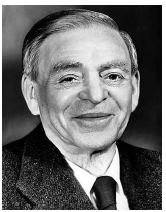
Born: February 23, 1884, Warsaw, Russian partition of Poland (presently Poland)
Died: January 19, 1967, New York, NY, USA
Early days. The son of a dermatologist, he studied in Berlin, Germany and in Bern, Switzerland, where he gained his doctorate in organic chemistry at the University of Bern, in 1904.
Professional career. He worked at the Pasteur Institute in Paris, then in the Wiesbaden Municipal Hospital in Germany, in the University of Berlin, and later at the Lister Institute in London. In 1915 he moved to the United States and held several industrial and university positions in New York. He became a naturalized citizen in 1920. With funding provided by the Rockefeller Foundation he returned to Warsaw in 1923 to serve as the director of the Biochemistry Department of the State Institute of Hygiene, but found Poland too politically unstable and in 1927 moved on to Paris where he started his own research institution, Casa Biochemica. At this time he married his wife, Gretchen, with whom he had 15 children. At the outbreak of World War II in 1939, Funk returned to the United States to work as a consultant for the United States Vitamin Corporation. He became the president of the Funk Foundation for Medical Research in 1940.
Contribution to science. After reading an article by the Dutchman Christiaan Eijkman that indicated people eating brown rice were less vulnerable to beri-beri than those who ate only the fully milled product, he tried to isolate the substance responsible and he succeeded around 1912. Because that substance contained an amine group, he called it vitamine . It was later to be known as vitamin B1 (Thiamine). He put forward the hypothesis that other diseases, like rickets, pellagra, and scurvy could also be cured by vitamins. He later postulated the existence of other essential nutrients, which became known as B1, B2, C, and D. In 1936 he determined the molecular structure of thiamin, though he was not the first to isolate it. He was the first to isolate nicotinic acid (also called niacin or vitamin B3). In his later research, Funk studied animal hormones and contributed to the knowledge about hormones of the pituitary and sex glands, emphasizing the importance of balance between hormones and vitamins. Funk also investigated the biochemistry of cancer, diabetes, and ulcers. He improved manufacturing methods for many commercial drugs and developed several new commercial products in his laboratories.
Sources:
Based on an article that appeared in Wikipedia
(all text is available under the terms of the GNU Free Documentation License)
Wikipedia
supplemented with information from other sources:
Polish Consulate in Sheffield, UK
Karen Bryla
Return to home page:
Prominent Poles